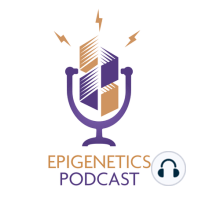34 min listen

CpG Islands, DNA Methylation, and Disease (Adrian Bird)
CpG Islands, DNA Methylation, and Disease (Adrian Bird)
ratings:
Length:
47 minutes
Released:
Jun 18, 2020
Format:
Podcast episode
Description
In this episode of the Epigenetics Podcast, we caught up with Sir Adrian Bird, Buchanan Professor of Genetics at the University of Edinburgh to talk about his work on CpG islands, DNA methylation, and the role of DNA methylation in human diseases.
Adrian Bird has been a pioneer in studying the CpG dinucleotide sequence. The CpG dinucleotide is distributed genome-wide and has several properties expected of a genomic signaling module. The influence of CpG signaling on prozesses like development, differentiation, and disease is hardly understood. Adrian Bird's work indicates that proteins that bind methylated CpGs recruit chromatin modifying enzymes to promote gene silencing. On the other hand, proteins that bind unmethylated CpGs lead to the formation of active, open chromatin. These results suggest that CpGs have a gobal effect on genome activity.
In neurons MeCP2 is almost as abundant as histones and is probably one of the best studied Proteins that bind to methyl-CpGs. Children who lack MeCP2 acquire serious neurological disorders, in particular Rett Syndrome. Rett Syndrome is caused by defects of a single gene, which lead to the opportunity to study its molecular mechanism, which involves MeCP2 in detail. Adrian Bird created a mouse model of Rett Syndrome which has lead to the discovery that reintroducing a functional MeCP2 gene in mice can lead to a "curation" of the symptoms.
In this interview, podcast host Stefan Dillinger and Adrian discuss CpG islands, DNA methylation, and how the discovery of MeCP2 lead to the discovery of a possible treatment of Rett Syndrome.
References
S. Lindsay, A. P. Bird (1987) Use of restriction enzymes to detect potential gene sequences in mammalian DNA (Nature) DOI: 10.1038/327336a0
R. R. Meehan, J. D. Lewis, … A. P. Bird (1989) Identification of a mammalian protein that binds specifically to DNA containing methylated CpGs (Cell) DOI: 10.1016/0092-8674(89)90430-3
R. R. Meehan, J. D. Lewis, A. P. Bird (1992) Characterization of MeCP2, a vertebrate DNA binding protein with affinity for methylated DNA (Nucleic Acids Research) DOI: 10.1093/nar/20.19.5085
Eric U. Selker, Nikolaos A. Tountas, … Michael Freitag (2003) The methylated component of the Neurospora crassa genome (Nature) DOI: 10.1038/nature01564
Robert J. Klose, Shireen A. Sarraf, … Adrian P. Bird (2005) DNA binding selectivity of MeCP2 due to a requirement for A/T sequences adjacent to methyl-CpG (Molecular Cell) DOI: 10.1016/j.molcel.2005.07.021
Jacky Guy, Jian Gan, … Adrian Bird (2007) Reversal of neurological defects in a mouse model of Rett syndrome (Science (New York, N.Y.)) DOI: 10.1126/science.1138389
Daniel H. Ebert, Harrison W. Gabel, … Michael E. Greenberg (2013) Activity-dependent phosphorylation of MeCP2 threonine 308 regulates interaction with NCoR (Nature) DOI: 10.1038/nature12348
Contact
Active Motif on Twitter
Epigenetics Podcast on Twitter
Active Motif on Linked-In
Active Motif on Facebook
eMail: podcast@activemotif.com
Adrian Bird has been a pioneer in studying the CpG dinucleotide sequence. The CpG dinucleotide is distributed genome-wide and has several properties expected of a genomic signaling module. The influence of CpG signaling on prozesses like development, differentiation, and disease is hardly understood. Adrian Bird's work indicates that proteins that bind methylated CpGs recruit chromatin modifying enzymes to promote gene silencing. On the other hand, proteins that bind unmethylated CpGs lead to the formation of active, open chromatin. These results suggest that CpGs have a gobal effect on genome activity.
In neurons MeCP2 is almost as abundant as histones and is probably one of the best studied Proteins that bind to methyl-CpGs. Children who lack MeCP2 acquire serious neurological disorders, in particular Rett Syndrome. Rett Syndrome is caused by defects of a single gene, which lead to the opportunity to study its molecular mechanism, which involves MeCP2 in detail. Adrian Bird created a mouse model of Rett Syndrome which has lead to the discovery that reintroducing a functional MeCP2 gene in mice can lead to a "curation" of the symptoms.
In this interview, podcast host Stefan Dillinger and Adrian discuss CpG islands, DNA methylation, and how the discovery of MeCP2 lead to the discovery of a possible treatment of Rett Syndrome.
References
S. Lindsay, A. P. Bird (1987) Use of restriction enzymes to detect potential gene sequences in mammalian DNA (Nature) DOI: 10.1038/327336a0
R. R. Meehan, J. D. Lewis, … A. P. Bird (1989) Identification of a mammalian protein that binds specifically to DNA containing methylated CpGs (Cell) DOI: 10.1016/0092-8674(89)90430-3
R. R. Meehan, J. D. Lewis, A. P. Bird (1992) Characterization of MeCP2, a vertebrate DNA binding protein with affinity for methylated DNA (Nucleic Acids Research) DOI: 10.1093/nar/20.19.5085
Eric U. Selker, Nikolaos A. Tountas, … Michael Freitag (2003) The methylated component of the Neurospora crassa genome (Nature) DOI: 10.1038/nature01564
Robert J. Klose, Shireen A. Sarraf, … Adrian P. Bird (2005) DNA binding selectivity of MeCP2 due to a requirement for A/T sequences adjacent to methyl-CpG (Molecular Cell) DOI: 10.1016/j.molcel.2005.07.021
Jacky Guy, Jian Gan, … Adrian Bird (2007) Reversal of neurological defects in a mouse model of Rett syndrome (Science (New York, N.Y.)) DOI: 10.1126/science.1138389
Daniel H. Ebert, Harrison W. Gabel, … Michael E. Greenberg (2013) Activity-dependent phosphorylation of MeCP2 threonine 308 regulates interaction with NCoR (Nature) DOI: 10.1038/nature12348
Contact
Active Motif on Twitter
Epigenetics Podcast on Twitter
Active Motif on Linked-In
Active Motif on Facebook
eMail: podcast@activemotif.com
Released:
Jun 18, 2020
Format:
Podcast episode
Titles in the series (89)
Heterochromatin and Phase Separation (Gary Karpen): Heterochromatin plays a pivotal role in organizing our genome in the nucleus and separating active from inactive genomic regions. In this Podcast Episode our Guest Gary Karpen from UC Berkeley sits down with our Host Stefan Dillinger to talk about the re... by Epigenetics Podcast